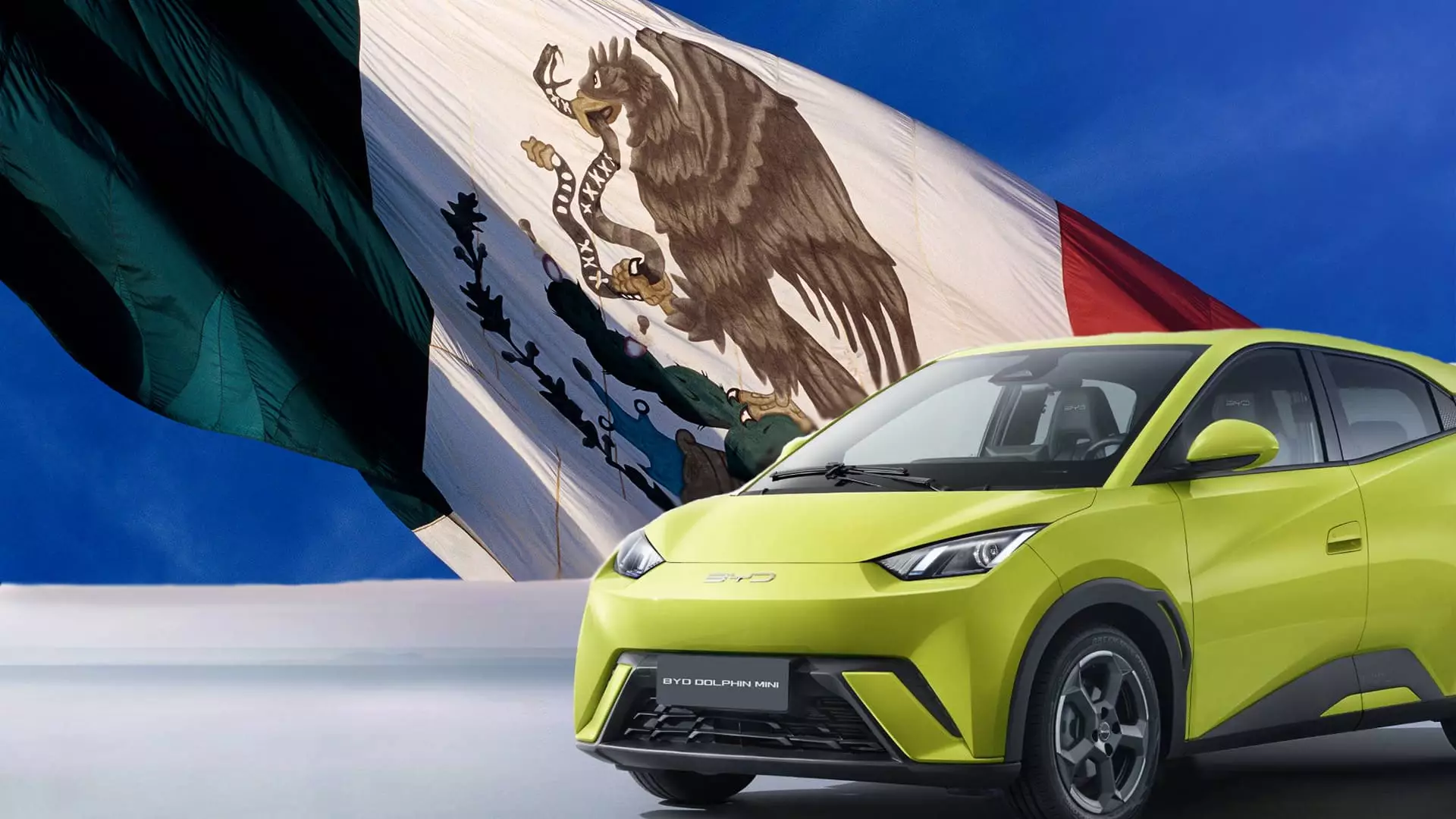As the global automotive industry undergoes a significant transformation towards electric vehicles (EVs), the complex interplay of trade policies, market strategies, and geopolitical dynamics has never been more pronounced. With the United States imposing tariffs to limit the influx of electric vehicles from China, Chinese automakers have turned their sights to Mexico as a new frontier. This shift not only highlights the aggressive expansion strategies of Chinese EV manufacturers but also raises alarm bells among U.S. officials concerning potential circumvention of trade barriers.
The recent surge of Chinese electric vehicles in Mexico is nothing short of remarkable. As reported, China became the top car supplier to Mexico last year, exporting an impressive $4.6 billion worth of vehicles. This aggressive market entry has been made possible by offering competitively priced models that resonate with consumers. For instance, BYD’s Dolphin Mini retails for approximately 398,800 pesos ($21,300), making it a more affordable alternative to Tesla’s models. Such pricing strategies are enabling not only the eco-conscious but also budget-savvy consumers to embrace electric mobility.
Juan Carlos Baker, a former Mexican deputy minister for international trade, emphasizes the tactical approach adopted by Chinese manufacturers: “They have very good promotions. It’s a good product that sells at a very reasonable price.” This statement underscores the sophistication of China’s marketing strategy, which capitalizes on appealing pricing while promoting high-quality products. As we see consumer preferences shift, the allure of affordability becomes a strong driver in the acceptance of electric vehicles.
Investment and Job Creation: A Double-Edged Sword
The ambitions of Chinese electric vehicle manufacturers extend beyond mere sales; they are actively seeking to establish production facilities in Mexico. Regions such as Durango, Jalisco, and Nuevo Leon are being eyed for potential factories, which BYD estimates could create around 10,000 jobs. While this influx of foreign investment presents a lucrative opportunity for economic growth, it raises significant concerns among U.S. policymakers. American officials worry that these actions could embody a strategic maneuver to penetrate the closely guarded U.S. market by exploiting Mexico’s trade agreements.
Scott Paul, president of the Alliance for American Manufacturing, points to Mexico’s evident attractiveness as a production base. The United States-Mexico-Canada Agreement (USMCA) allows for tariff-free access to the U.S. market if certain conditions are met, thereby creating an opportunity for foreign manufacturers to gain a foothold in North America. This functionality raises eyebrows amongst U.S. lawmakers and domestic automakers, who fear that bypassing tariffs through Mexico is a calculated move by Chinese companies.
The current state of U.S.-China trade relations has generated a precarious environment, often described metaphorically as a “game of whack-a-mole.” This phrase perfectly encapsulates the constant struggle between imposing tariffs and navigating the intricate landscape of international trade. As noted by Michael Dunne, CEO of Dunne Insights, the establishment of Chinese EV manufacturing capacities in Mexico would create formidable competition for American automakers, primarily due to their potentially lower production costs.
Furthermore, a recent announcement from President Joe Biden imposing a 100% tariff on Chinese electric vehicles signals a protective stance towards the nascent U.S. EV market, which he likens to an “infant industry.” Protecting emerging sectors from external competition is a common strategy among nations, but it often places allied countries like Mexico in a precarious position. This delicate trade balance compels Mexico to maintain a beneficial relationship with the U.S. while simultaneously attracting Chinese investment, a conundrum that could invite geopolitical tensions.
The burgeoning presence of Chinese electric vehicle manufacturers in Mexico presents a multifaceted challenge and opportunity. While there is potential for significant economic development through job creation and consumer choices, the risks associated with trade circumvention and competitive displacement of U.S. automakers loom large. As the electric vehicle landscape continues to evolve, U.S. and Mexican policymakers will need to navigate a nuanced path that balances trade interests and fosters sustainable economic growth in an increasingly interconnected environment. The outcome of this economic dance will shape not only the future of the automotive industry in North America but also the broader international trade relationships that bind these countries together.

